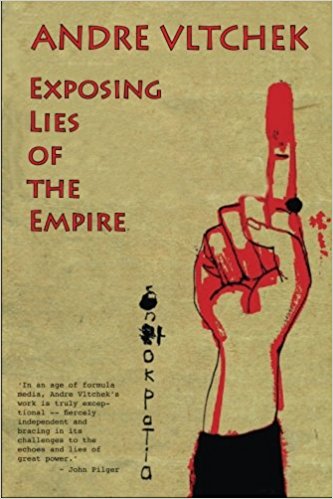This piece was reprinted by OpEd News with permission or license. It may not be reproduced in any form without permission or license from the source.
HOW I BECAME REVOLUTIONARY AND INTERNATIONALIST
Binu Mathew, Editor in Chief of Countercurrents interviews Andre Vltchek
1 BM: You are one of the foremost critics of imperialism. Can you tell
us
how you came to be who you are? Can you tell us about your formative years?
AV: Formative years" There were many of them, and actually, I feel that I am still evolving, until now. People always do, I believe and hope.
I was born in the Union of the Soviet Socialist Republics, in an unbelievably beautiful city of Leningrad, built by insane Peter the Great and by few no less insane Italian and French architects, on the shores of wide and powerful river Neva, right near the mosquito-infested swamps.
I did not live there long, just three years or so, but the city always stayed inside me.
My mother is half Russian, half Chinese, while my father is Czech, a scientist. At the age of three I was taken to a boring, industrial city of Pilsen (Plzen) in what was then then Czechoslovakia; a city also known for its beer and proximity to Bavaria.
My father belongs to that old generation of scientists who believed that they could change and improved the world. He loved classical music, philosophy, literature and good wine -- to him, all this was inseparable from the scientific concepts, from dreaming and imagining. He explained Theory of Relativity of Einstein to me, when I was 8, and he taught me how to play chess and think logically.
My mother was just a baby when the WWII erupted. Half of my family died during the siege of Leningrad, starved and bombed by German Nazis. She actually almost died from starvation. My grandma fought Germans, was decorated for bravery: she helped to defend and then to rebuild her beloved city. Her husband, my grandfather, was a Communist, a Soviet cabinet minister, and an ethnic Chinese from Kazakhstan. He held ministerial posts for medical care and for food supply. He was denounced as a Japanese spy before the war (during the time when German spy network managed to infiltrate Soviet intelligence communication network and literally fed with fake information the Soviet leadership, significantly weakening it before that war). My grandfather was executed. Then, 'rehabilitated' posthumously, when the truth surfaced, finally. He was the love of my grandma's life; she never remarried again.
Why am I telling you this, Binu? Because my formative years began when I was 3. My family was pulling me apart. My grandmother and my mother educated me as a Soviet boy, on great Russian literature, music, poetry. Every year I was sent for 2-3 months to Leningrad, to my grandma, and she would spoil me silly, dragging me to the opera houses, to concerts, museums. I loved and missed Russia enormously, while living most of the year in emotionally cold and pragmatic Czechoslovakia.
Both women -- mother and grandmother: never tried to spare me of all those horrors they survived during the war. I lived through their stories they had to go through during the Siege of the city. My mother would often read me Russian poetry, and she cried. She missed her country and her city, tremendously. She was terrified by the war, even so many years after it ended. I was missing Leningrad, too. I still do.
Then the 1968 came, and I was just barely 5. Since then, there was no childhood. Since the first grade of elementary school, my life was one huge battle for survival. Between each class, several boys would come and unceremoniously beat me up, just for having Russian mother. First, I suffered in silence. Then I began fighting back. You know how racist Europeans are. I was constantly attacked not only because my mother was "Russian"; it was mainly because she had Asian features. I still remember that talk: "Look at your disgusting Asian ears, you sh*t". When I played badminton in a gym, kids were pissing into my shoes during winter, and urine would turn to ice.
My parents divorced. Their marriage collapsed. But also, their political ideas were different. My father left Communist Party of Czechoslovakia. I was getting two totally different interpretations of the political events, since I was 5. From several highly intellectual and bright individuals in my family. I had to decide what was right and wrong.
They destroyed my childhood, but made a tough writer out of me, at a very early age.
Next Page 1 | 2 | 3 | 4 | 5 | 6 | 7 | 8 | 9
(Note: You can view every article as one long page if you sign up as an Advocate Member, or higher).





